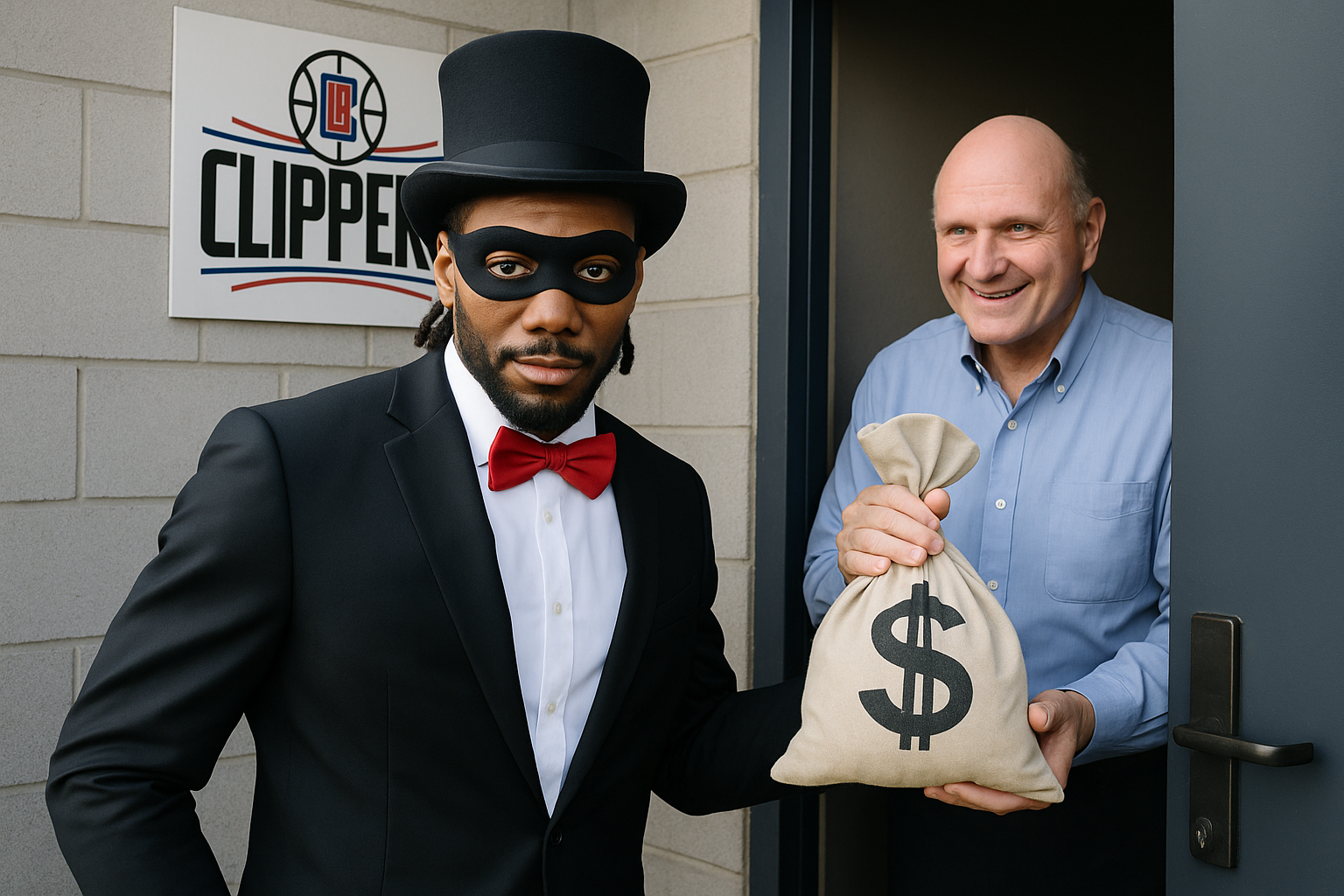L.A. Clippers: The Usual Suspects
You wake up. Check your phone: “Clippers skirted cap with Kawhi payment.”
You blink. You laugh. You check if it’s April 1st. Then you read it again: “$28 million to Kawhi Leonard… for a no-show job.”
Suddenly, all those DNPs and “knee management” reports read like fake alibis in a botched casino job. This wasn’t just rest. This was cap laundering.
The setup was simple: One silent superstar. One bottomless billionaire. One consulting gig that never existed.
A ghost payroll scandal, a silent superstar, and a billion-dollar franchise that just got caught doing the dumbest version of the oldest trick in the book.
Like all bad heists, the plan was simple — and the cover-up even dumber.
The Tell
So I’m supposed to believe that somebody wanted to pay Kawhi Leonard $28million… for his acting chops?! Kawhi has the emotional range of a parking meter and the screen presence of a tax form.
Were we supposed to believe he earned more from a ghost job than most of SAG-AFTRA in 2024?
Let’s be real: the only role he ever nailed in Los Angeles was Kawhi Leonard, Disinterested Forward.
You know what’s impressive? Kawhi Leonard load-managed a second job. Got paid to not work while also not playing.
That’s next-level multitasking. No press conferences. No controversy. No comments.
Just silence — and a direct deposit with more zeros than vowels in his postgame interviews.
When the Supermax Isn’t Enough
Greed used to wear suits. Now it wears compression sleeves and gets routine DNPs. Kawhi already signed for max money. Endorsements? Handled. Sneaker deal? Check.
And yet here we are — needing to sneak him an extra $28 million under the table. Why? Because in the modern NBA, the money doesn’t stop at the cap.
It’s not about salary anymore — it’s about access.
The real value is what you can get paid without it counting. This is a symptom of the post-Supermax era: Where stars aren’t just chasing rings — they’re chasing tax shelters with player options.
If You Aren’t Cheating, You Aren’t Trying
This isn’t new. This isn’t clever. And it definitely isn’t isolated.
Pro Sports Cap Evasions:
Joe Smith & the Timberwolves (1999): Minnesota got slammed for hiding a secret contract that guaranteed future money outside the books. NBA dropped a hammer: $3.5M fine, five first-round picks stripped.
Jerry Reinsdorf & MJ’s “Retirement”: Let’s be real. Michael didn’t retire to play baseball. He took a cap-friendly sabbatical while quietly staying on the Bulls’ books.
The Lakers & Magic Johnson’s 25-Year Deal (1981): Not illegal, but absolutely a workaround. $25 million over 25 years = loyalty locked in, cap headaches avoided.
College Athletics: Under-the-Table U
SMU Football (1987): Got the death penalty for slush funds and boosters paying players. They had more secret payrolls than Enron.
Reggie Bush / USC: Lost a Heisman over improper benefits. Dude had a rent-free mansion and a car before NIL was cool.
Fab Five / Michigan: Chris Webber received hundreds of thousands from a booster while playing "amateur" ball. We’ve always paid stars under the table. Now we just pretend they’re “brand consultants.”
We’ve always paid stars off the books. Now we just print the lie on letterhead.
Ballmer.EXE Enters the Chat
The Clippers don’t have the luxury of decades of banked goodwill with the league office. Steve Ballmer didn’t stumble into this like some wide-eyed tech billionaire who accidentally pressed “Circumvent Cap” on a touchscreen. No, this was intentional from Day 1.
The man bought his way into the league and immediately started breaking it like it was a beta test. No credit for good behavior, no legacy rope, no “he’s part of the fabric” treatment — just brute-force spending, Silicon Valley shortcuts, and a roster of aging stars with contracts duct-taped together by shell jobs and soft tissue excuses.
He didn’t evolve into a cap criminal. He launched as one.
Ballmer didn’t build an NBA team — he built a tax evasion LLC with courtside seats.
Your Move, NBA
So what happens now? The NBA launches an investigation. That means depositions, subpoenaed emails, "consulting agreements" that never had deliverables, and probably a few Zoom calls Kawhi never joined. The league’s legal team will comb through payment structures, contract timing, and Ballmer’s PR machine, trying to figure out whether this was a simple overpayment or a deliberate cap dodge.
It’ll take time. These things always do. For reference, the Joe Smith saga dragged on for months in 1999 before the NBA dropped the hammer — and it was a much simpler case: Smith and the Timberwolves had a handshake deal for illegal future payments. The punishment? A $3.5 million fine and five first-round picks stripped.
Now let’s scale that up.
Adjusted for US Dollar inflation, that $3.5M is about $6.65M today.
Adjusted for cap inflation (1999: $34M cap; 2025: $141M), that fine should be ~$14.5M.
But Minnesota is a small market. LA is a megamarket.
Ballmer isn’t Glen Taylor. He’s worth over $120 billion.
$25 million should be the floor if the NBA wants this to sting. Otherwise, they’re just encouraging every owner with a cash pile to keep trying until they get caught — and when they do, to treat it like a parking ticket.
And what about the picks?
The Clippers’ current draft capital looks like this:
2026: 2nd-round picks (own and via Memphis, heavily protected and convoluted)
2027: 1st-round (own, but subject to swap with OKC)
2029: 1st-round (own, but PHI holds swap rights if it’s outside the top 3)
2030-2032: Own all 1st- and 2nd-round picks
If the NBA wants to mirror the Wolves punishment — and add a market-size multiplier — we’re likely looking at:
$25 million fine
Forfeiture of 2-5 future 1st-round picks, likely starting in 2030
Loss of exception usage or league-imposed hard cap for a year
The league may choose not to retroactively void Kawhi’s deal — too messy, too late — but it can absolutely neuter the team’s flexibility going forward.
Ballmer tried to cheat the system. The question now is whether Adam Silver is going to hit him with a fine… or finally put a few billionaires on notice.
Is There Any Hope for Clipper Nation?
Let’s not pretend this franchise had a rich tradition of clean wins to begin with. But this? This is an existential punch to the gut.
Fans are being asked to root for a team whose biggest moves happen in the shadows — not on the court. They were sold a vision: new arena, new culture, new era. Instead, they got a ghost payroll, a scandal, and a superstar who doesn’t talk.
So where’s the hope? Hope is in the chance that, for once, the Clippers own their future instead of mortgaging it for someone who might play 48 games. Hope is in the teardown.
Clipper Nation may not be cursed — but it is getting audited.
As for me?
Hope can wait.
I’m furious.
There Aren’t Any Winners Here
Spare a thought for the league office intern combing through shell corporations and fake LLCs tied to Ballmer’s payouts. Spare a thought for Clippers fans who bought jerseys, season tickets, and dreams of legitimacy — only to realize the pillars were hollow.
This was supposed to be different.
Steve Ballmer wasn’t just a billionaire — he was one of us, they said. A fan. A courtside hype beast. The guy who’d dance, yell, and finally give the Clippers a soul. Instead, he gave them a spreadsheet and a scandal.
Kawhi Leonard wasn’t just a superstar — he was the antidote. The quiet killer. The anti-LeBron. A man who didn’t want the spotlight, just the work. Who was going to out-discipline the league into submission. Instead, he ghosted half his games, then picked up a $28 million check for ghosting his job.
And now?
Kawhi’s contract expires next season. After this, teams will circle with lowball offers for his expiring deal. And after that — we may never see him again. He never wanted the cameras. He never chased the spotlight. And now, after quietly bleeding the Clippers dry, he may slip out the side door.
In the final scene of The Usual Suspects, Agent Kujan realizes the man he’s been interrogating — Verbal Kint — has lied to him from the beginning. The limp vanishes. The coffee cup shatters. The truth falls into place. And as Kint drives off with his imaginary lawyer, he delivers the line:
“After that, my guess is that you’ll never hear from him again. The greatest trick the devil ever pulled was convincing the world he didn’t exist. And like that... he’s gone.”
And just like that…
He’s gone.
Todd / 120 Proof Ball
If you liked this piece, you’re part of the problem.



